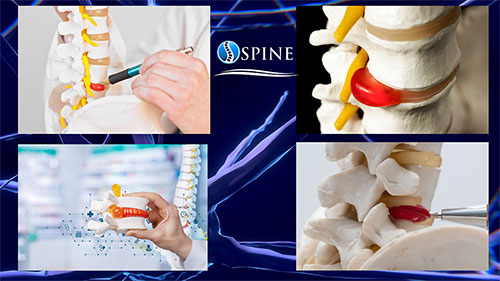
Pain management for a herniated disc or a pinched nerve can help you get back to enjoying your life. The pain that patients with herniated discs experience can limit mobility and lead to other issues with regard to walking and participating in physical activities. Over the long term, mental health can be impacted as well. The good news is that herniated discs do not require surgery and can be treated with a variety of injections and therapies.
What Is a Herniated Disc?
Discs are the soft cushion between each spine. When a disc herniates, it bulges out from its annulus, often putting pressure against a neve and causing pain that can radiate through the arms and legs. Because discs function as shock absorbers for the spine, they endure a lot of wear and tear. Most herniated discs are caused by degeneration due to age, but they can also be caused by excessive strain or an injury. Some people are more likely than others to develop herniated discs, which tend to be hereditary.
Herniated Disc Symptoms
Herniated discs can happen in your neck (cervical spine) or your lower back (lumbar). Symptoms will vary depending on the location of the herniated disc, the level of herniation, and whether the herniated disc is pressing on a nerve. Some people do have more than one herniated disc. A lumbar spine herniated disc can result in sciatica. Cervical spine symptoms can result in neck pain, pain between your shoulder blades, and pain that radiates down the arms and into the fingers. Pain can increase with movement, and depending on the location of the herniated disc, you may experience numbness in your fingers or toes.
How We Can Help
If you are a Columbus-area patient suffering from a herniated disc or discs, Spine LLC is here to help. Our customized pain management treatments are designed to reduce your pain as immediately as possible while also focusing on healing your body, using the least invasive methods. Most people who have herniated discs do not require surgery, because they respond well to less invasive therapies. For example, one very helpful technique to treat a herniated disc is the use of cortisone injections. By reducing the inflammation, the pressure on the nerve decreases and so does the pain. Oral steroids can also be useful for this purpose. Other therapies, such as traction, heat therapy, and electrical stimulation can also be helpful. The one thing we do not recommend in the treatment of a herniated disc is bed rest. Movement is essential to helping you improve your disc health.
Don’t Settle for a Life of Pain
If you’re struggling with pain from a herniated disc, you don’t have to live with the pain. At Spine LLC, our focus is on giving our patients the ability to reclaim their lives through better pain management, more innovative healing therapies, and increased mobility. We specialize in treating pain conditions with a spectrum of proven therapy options ranging from conventional procedures to the latest technology- and science-based approaches. Talk to your primary care physician today for a referral to our specialized pain management clinic and to arrange for a consultation. Let us determine which approach might be most effective for you.
Step away from chronic pain.

